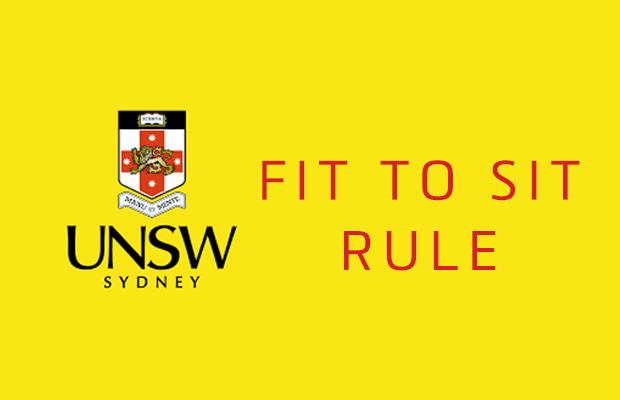University of New South Wales (UNSW) students are now required to choose between making a special consideration application or completing an assessment.
Students received an email announcing a series of changes to Academic Standing Policy on 6 March, explaining that “if you sit an exam or submit a piece of assessment, you are declaring yourself fit to do so and cannot later apply for Special Consideration.”
Special considerations applications may be made by students “when illness or other circumstances beyond your control, interfere with [their] ability to sit or submit an assessment,” according to the email. If successful, the student may be able to sit an alternate exam or resubmit their assessment at a later date.
Where students could previously apply up to three days afterwards, they are now required to choose between completing their assessment and applying for special consideration.
In a document attached to their announcement email, UNSW management explained that although students may still alert their exam invigilators and apply for special consideration “if you determine you are not well during an examination…You are no longer able to apply for Special Consideration if you have sat the exam.”
“Exceptions will be dealt with on a case-by-case basis where it is clear that illness prevented you from making an informed decision.”
UNSW Student Representative Council (SRC) President Angela Griffin told Honi that, “Not enough communication has been pushed to inform students of the changes…‘Fit to Sit’ disallows [those affected by misadventure] peace of mind.”
2017 Education Officer and 2017-18 Academic Board Student Representative Dylan Lloyd suggested this required students make a “gamble,” given special consideration applications are not certain to be accepted.
“This gamble means additional stress and anxiety on top of the issues students face due to their misadventure or disability/ies.”
Lloyd suggested these problems would likely be exacerbated by accompanying changes made to the special consideration application process. Students once applied to teachers and course convenors —likely familiar with their situation. Instead, applications will go through a centralised administrative system. This means decisions are no longer made with “the aid of contextual information [needed] to make an informed decision on the application.”
Students With Disabilities (SWD) Officer, Donna Hogan, found the changes to be similarly worrying.
“This policy will disproportionately impact students with disabilities…Disabled students will not have faith that any conditions that might flare up suddenly (like epilepsy for example) will be reasonably considered,” they said.
“Having to sit an exam without knowing if your medical condition will flare up or how a mild illness will interact with your disability will cause intense, unnecessary anxiety for a group of students who already have to manage more than their abled counterparts.”
However, Hogan did suggest that the special consideration centralisation may have positive outcomes for students, enabling “track[ing those] repeatedly accessing special considerations and connect[ing] them with educational support.”
Worryingly, Griffin told Honi that the “policy was not officially passed through Academic Board (UNSW’s peak academic policy body) as most academic policies would. [Students had] no opportunity to change or adapt the policy and we feel that important student considerations have been missed.”
The fit to sit policy document explained the University’s reasoning.
“This is to ensure that if you feel unwell or are faced with significant circumstances beyond your control which affect your ability to study, you do not sit an examination or submit an assessment which does not reflect your best performance.”
UNSW is currently in the process of developing a Disability Inclusion Action Plan, however, have not “seriously considered” consulting with the SWD Collective, according to Hogan.
Griffin concluded, “UNSW student representatives pride ourselves on having positive relationships with our university management.” They urge[d] UNSW to reconsider the policy and work with [students] to address the welfare aspects that we have key concerns with.” Honi understands that a motion may be put forward in an SRC meeting next week to condemn the changes.
This article has been amended to reflect the fact that exemptions may be made for students who have sat exams and still seek special consideration.





